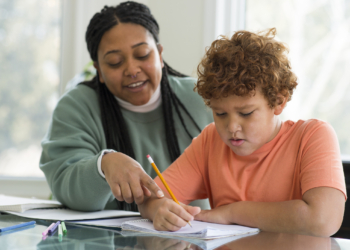
Three hundred years later, post-war parents were powerless against the threat of nuclear attack but could control whether their children ate enough servings of fruits, vegetables, bread, and dairy each day. Parents in the 1970s and 1980s seem, from today’s vantage point, irrationally obsessed with a fear of kidnapping, which may reflect a more deep-seated worry about whether the entry of women into the workforce was a form of child abandonment. The tendency for parents today to control their children’s time via over-scheduling of “enrichment” activities could be interpreted as a response (rational or irrational) to concerns about child safety, especially in light of the potential dangers lurking on nearby screens. The more likely drive toward the “concerted cultivation” of children, however, is a fear response to economic anxieties. The current generation of parents is the first to have less overall wealth, on average, than the preceding generation of parents. This trend is expected to continue, not reverse. And with rare exceptions, parents today are no longer training their children for a skilled trade or a place in the family business. The overscheduling of the middle-class child with violin lessons and Chinese language tutors and indoor soccer leagues may feel like, as Nora Ephron joked, “force-feeding it like a foie gras goose.” In truth, the (Ephron’s words again) “altering, modifying, modulating, manipulating, smoothing out, improving” efforts that embody twenty-first-century parenting are a fear-driven attempt to prepare children for the harsh economic landscape awaiting them at the end of childhood.
Anxiety alone does not explain the immersive, all-in approach to raising children that has made parenting a competitive and often unenjoyable sport. The demographics have changed too. Parents today are older when they first take on the role of mom or dad (the average age at first birth for college-educated women now exceeds thirty years of age) compared to their own parents and grandparents. And with older age comes fewer children, so that today’s kids can consume greater and greater quantities of their parents’ attention. I had three brothers and am hard-pressed to remember classmates who were only children; the few I can remember were the children of divorce, and most had half-siblings (and entirely separate families) against whom they were competing for their parents’ time.
Postponing parenthood also gives couples more years of childless freedom against which their child-rearing years can be compared. The before versus after contrast can be taxing on parents who may question why they relinquished this freedom to join the ranks of a stressed, exhausted, and often miserable cohort. Non-parents consistently report being happier, when quantified in studies, than parents. Interestingly, the country with the greatest gap in happiness levels between parents and non-parents is the United States, by a significant margin (the differences in such levels correlate, to some degree, with the availability of childcare and other nationally provided welfare benefits). Parental unhappiness may not be a new phenomenon, but open discussion about such unhappiness clearly has hit its stride in the modern era. Unhappy parents who believe that “better” children hold the key to unlocking a secret realm of family happiness are willing to try (and buy) anything to reach that goal.
 Andrew Bomback is Associate Professor of Medicine at Columbia University Irving Medical Center and the author of “Doctor.” His essays have appeared in the Atlantic, Los Angeles Review of Books, McSweeney’s and elsewhere. He lives in Hastings on Hudson, New York.
Andrew Bomback is Associate Professor of Medicine at Columbia University Irving Medical Center and the author of “Doctor.” His essays have appeared in the Atlantic, Los Angeles Review of Books, McSweeney’s and elsewhere. He lives in Hastings on Hudson, New York.















